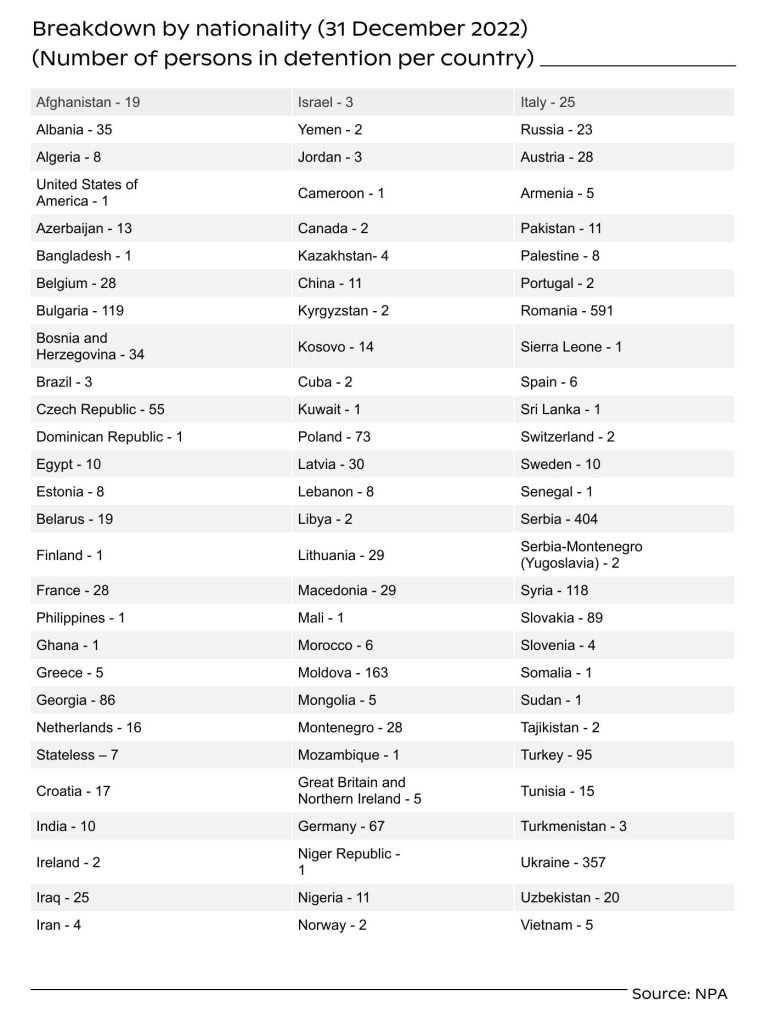New rules to reduce prison overcrowding affecting foreign detainees
The reduction of the overcrowding of Hungarian prisons is a legitimate aim, however it is yet to be seen how the necessary guarantees, such as access to quality legal aid, and interpretation, and the assessment of non-refoulement are secured for foreign detainees.
As of 13 January, the Government Decree 3/2023 on the application of certain rules of the Penitentiary Code (hereinafter: Decree) introduced specific rules on non-Hungarian detainees. The Decree tries to address the issue of the increasing number of detainees, unprecedented in the past 30 years.
The Hungarian government terminated the state of danger on 1 November 2022 and then re-declared it on the same day. The newly introduced state of danger refers to the war in Ukraine and allows the government to override Acts of Parliament via emergency government decrees. The government can rule by decree without any parliamentary oversight and without any public consultation or impact assessment.
According to the Decree, upon the request of a non-Hungarian convicted detainee, the head of the National Prison Administration (NPA) shall suspend the execution of the sentence of imprisonment and have the detainee transferred to another country if certain conditions are met; most importantly i) the Minister of Justice (MoJ) declares that the transfer of the enforcement of the custodial sentence is not excluded, and ii) if the foreign detainee consents to the enforcement of the custodial sentence in another State.
The enforcement of a custodial sentence may not be suspended if:
- there is another custodial sentence to be served in Hungary;
- criminal procedure is pending against the foreign detainee in the territory of Hungary;
- the foreign convict is sentenced to life imprisonment;
- there are five years or more remaining on the term of imprisonment; or
- the foreign national has been sentenced to a custodial sentence to be served for certain gravios offences.
The main steps of the procedure as prescribed by the Decree:
- The non-Hungarian convicted detainee may submit his request for the suspension of the enforcement of the sentence of imprisonment at the penitentiary institution. In the request the detainee shall include the State in respect of which he consents to the transfer of the enforcement of the custodial sentence and his personal circumstances in relation to the State, and also the legal basis for his right of residence there, the documentary evidence of his right of residence and the way in which his return to the country concerned by the transfer of the enforcement of the custodial sentence is ensured.
- The prison forwards the foreign prisoner’s application to the head of the NPA, which shall examine whether there is any obstacle to the suspension.
- If the execution can be suspended, the request is forwarded to the MoJ, to the penitentiary judge and to the National Directorate-General for Aliens Policing (NDGAP).
- The MoJ declares that the transfer of the enforcement of the custodial sentence is not excluded, and forwards the declaration to the NDGAP.
- The MoJ declares whether the transfer of the enforcement of the custodial sentence is excluded, and indicates the shortest period of custodial sentence that may be transferred.
- The penitentiary judge or the judicial secretary informs the detainee on the essential circumstances and consequences of the transfer of the enforcement of the custodial sentence and asks him to provide information on his relevant personal circumstances. The hearing has to be video recorded.
- The penitentiary judge sends the minutes of the hearing to the NPA.
- The NDGAP provides a preliminary opinion on the execution of the expulsion order.
- The head of the NPA delivers a decision on the suspension of the conviction based on the information provided by the authorities and the minutes of the detainee’s hearing. The head of the NPA may grant or decline the request of the non-Hungarian detainee. The NPA informs the NDGAP on the decision without delay.
- Within three working days of the delivery of the decision, a judicial review may be submitted by the foreign detainee and by the prosecutor’s office against the decision rejecting the application for suspension of the enforcement of the sentence of imprisonment. This has a suspensive effect on the enforcement of the expulsion. The court delivers its decision on the basis of the documents submitted by the penitentiary judge.
As of 31 December, 15 % of the Hungarian prison population was 19,347, out of those 2,893 were foreigners.

The reduction of the overcrowding of Hungarian prisons is a legitimate aim, however it is yet to be seen how the necessary guarantees, such as access to quality legal aid, and interpretation, and the assessment of non-refoulement are secured for foreign detainees.
The HHC has already received concerning complaints.